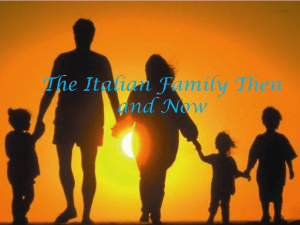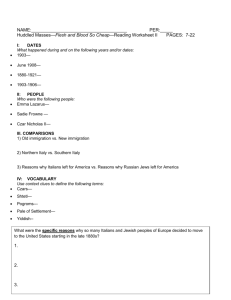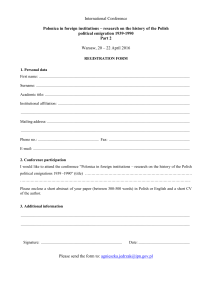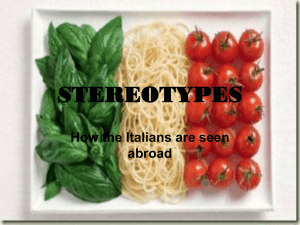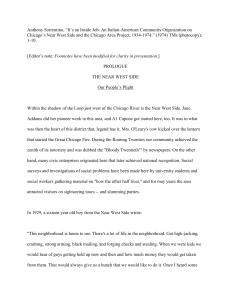National stereotypes
advertisement
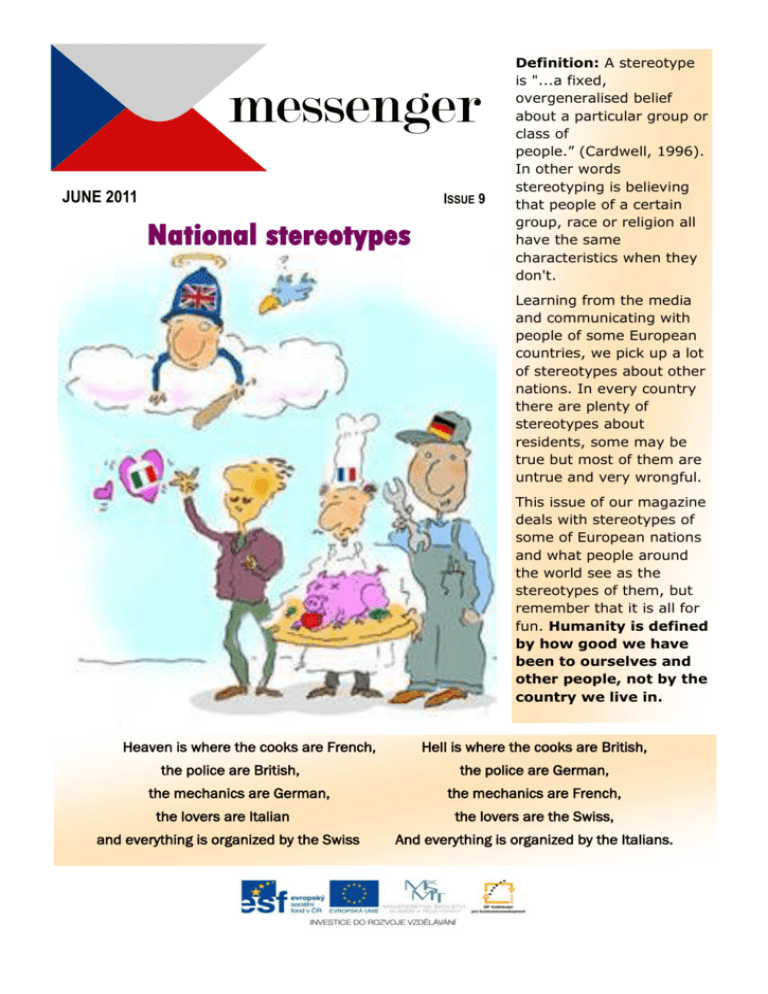
JUNE 2011 ISSUE 9 National stereotypes Definition: A stereotype is "...a fixed, overgeneralised belief about a particular group or class of people.” (Cardwell, 1996). In other words stereotyping is believing that people of a certain group, race or religion all have the same characteristics when they don't. Learning from the media and communicating with people of some European countries, we pick up a lot of stereotypes about other nations. In every country there are plenty of stereotypes about residents, some may be true but most of them are untrue and very wrongful. This issue of our magazine deals with stereotypes of some of European nations and what people around the world see as the stereotypes of them, but remember that it is all for fun. Humanity is defined by how good we have been to ourselves and other people, not by the country we live in. Heaven is where the cooks are French, the police are British, the mechanics are German, the lovers are Italian and everything is organized by the Swiss Hell is where the cooks are British, the police are German, the mechanics are French, the lovers are the Swiss, And everything is organized by the Italians. The British Personal characteristic British people live in the UK. They are people who live in England, Scotland, Wales or Northern Ireland. British people can also either be English, Scottish, Welsh, or Irish (from Northern Ireland only). The British are said to be reserved in manners, dress and speech. They are famous for their politeness, self-discipline and especially for their sense of humour. British people have a strong sense of humour which sometimes can be hard for foreigners to understand. "No hugs, dear. I'm British. We only show affection to dogs and horses." - Jocelyn Dashwood Appearance, clothes, fashion The most common image people have of a typical Englishman is a man wearing a bowler hat, a pin striped suit, a newspaper under the arm and carrying a long unopen umbrella." Favorite topics for conversation The weather, definitely. As this is impersonal topic. The British are reserved as already mentioned and they don´t like speaking about themselves and their private life. Pastime/leisure time activities Saturday is traditionally the day for shopping and watching sports. The British are known as a nation of gardeners. Most people have a garden on their property. Gardening has been a popular pastime since Roman times.Many people in Britain are proud of their houses and gardens. They want their houses and gardens to look nice. Every town in Britain has one or more DIY (Do it Yourself) centres and garden centres. Many of the world's famous sports began in Britain, including cricket, football, lawn tennis, golf and rugby England's national sport is cricket although to many people football (soccer) is seen as our national sport. Football is our most popular sport. Some of England's football teams are world famous, the most famous being Manchester United, Arsenal and Liverpool. Going to the pub is the most popular leisure activity outside the home. Pubs are an important part of British life. People talk, eat, drink, meet their friends and relax there. 2 Family There is an English saying My home – my castle. The most popular type of home in England is semi-detached (more than 27% of all homes), closely followed by detached then terraced. Britain is famous for being a nation of animal lovers, and many people in Britain keep pets. More than 50 per cent of British families own a pet. We keep some 7.7 million cats, 6.6 million dogs, one million budgerigars and 18 million goldfish. Holiday destinations Two-thirds of all British people have their holidays in July and August, which are the most popular months for holidays. English school children are on holiday from the end of July to the beginning of September. The traditional British holiday is a seaside holiday. There are places near the sea, such as Blackpool, Scarborough and Bournemouth. Favourite food/drink British food has traditionally been based on beef, lamb, pork, chicken and fish and generally served with potatoes and one other vegetable. The most common and typical foods eaten in Britain include the sandwich, fish and chips, pies like the cornish pasty, trifle and roasts dinners. Some of our main dishes have strange names like Bubble & Squeak and Toad-in-the-Hole. The English like tea and drink it in all possible ocassions: Tea solves everything. You're a bit cold? Tea. Your boyfriend has just left you? Tea. You've just been told you've got cancer? Tea. Coordinated terrorist attack on the transport network bringing the city to a grinding halt? TEA DAMMIT! The British are proud of Their country, the Queen and Royal family. Superstitions Good Luck Lucky to meet a black cat. Black Cats are featured on many good luck greetings cards and birthday cards in England. Lucky to touch wood. We touch; knock on wood, to make something come true. Lucky to find a clover plant with four leaves. White heather is lucky. A horseshoe over the door brings good luck. But the horseshoe needs to be the right way up. The luck runs out of the horseshoe if it is upside down. Horseshoes are generally a sign of good luck and feature on many good luck cards. Bad Luck Unlucky to walk underneath a ladder. Seven years bad luck to break a mirror. The superstition is supposed to have originated in ancient times, when mirrors were considered to be tools of the gods. Unlucky to see one magpie, lucky to see two, etc.. Unlucky to spill salt. If you do, you must throw it over your shoulder to counteract the bad luck. Unlucky to open an umbrella in doors. The number thirteen is unlucky. Friday the thirteenth is a very unlucky day. Friday is considered to be an unlucky day because Jesus was crucified on a Friday. Unlucky to put new shoes on the table. 3 The Scots Personal characteristics By world standards Scots are very well-educated people. And although the location of Scotland, tucked away in a distant corner of Europe, might have once kept Scots out of touch with the rest of the world, they have had, since the 18th century, a distinctly global outlook. Generations of Scottish emigration means that few Scots are without relatives in countries such as New Zealand, Australia, Canada, South Africa, or America. The Scots view of themselves is often quite difficult for visitors to understand. That view tends to be a mixture of outrageous pride and incredible cynicism. It's a complex mixture. Typical Scots can never praise Scotland without a hint of irony in their voice - and can never criticize it without betraying a deep love of their country. Scots have a deadpan style of humor; a reluctance to express enthusiasm for anything in direct terms - thus, " It's no bad, " becomes the equivalent of " It's fantastic. " Pastime activities On many occasions - at New Year, at weddings, ceilidhs, at parties, at major soccer games - Scots will dance, sing, kiss, embrace, cheer and let themselves go. Scots also have a tendency towards what can only be described as sentimentality. When a few Scots are gathered together, looking back on a history of lost causes and what-might-have-beens, it can very quickly bring on a general communal malaise. Add a few beers, the right music, or poetry, or song, and the combination can be melancholic in its effect. Not that all Scots would describe themselves as traditional-music fans. But sit in a Scottish pub at the end of the evening when a singer strikes up the opening of Scotland's only real national anthem, " Flower of Scotland, " and you will see the tears well up in the eyes of grown men. Appearance Kilts probably come to your mind when you think of Scottish fashion. The kilt is the symbol most people think of as irrevocably Scottish. The kilt has its origins in ancient Highland garb but despite its origins, both Highlanders and Lowlanders are proud to wear it. During re-enactments fairs, Tartan days and other such occasions celebrating all things Scottish, the kilt turns up in all its glory. It has become the accepted traditional costume around the world, and like all such attire it is usually worn on special occasions as proof of continuing cultural heritage and national pride. A joke Did you hear about the thoughtful Scotsman who was heading out to the pub? He turned to his wee wife before leaving and said, 'Jackie - put your hat and coat on lassie.' She replied, 'Awe Iain that's nice - are you taking me to the pub with you?' 'Nah, just switching the central heating off while I'm oot.' 4 The French Personal characteristic The French are friendly, helpful, romantic, sophisticated. The French will say "pas mal" (not bad) even if they win the lottery! They are not loud, and they are reserved in their expressions. The French strike a lot, smoke a lot and are hypochondriacs (pharmacy can be foun almost in every street!). Appearance, clothes, fashion Fashion and style is often closely associated with France. The French are, as a whole, well dressed and take pride in their overall appearance. Jeans, tshirts, and sweatpants are far less common in France. And they never wear sandals with socks in them and plastic bags! Women are known for their high heels, and the graphic t-shirts. There is a feeling of formality, and well-made, well-tailored clothes are the norm. Likes/dislikes The French do not like foreigners and their president. Pastime/leisure time activities The game of boules, otherwise known as pétanque, is perhaps the sport that is closest to French hearts. Similar to British lawn bowling or Italian bocce, the French version is traditionally played with metallic balls on a dirt surface beneath plane trees, with a glass of pastis at hand. The local boulodrome is a social focal point in southern France. The object of the game is to throw your balls — usually with somewhat of an arched back-spin — so that they land closer to the small object ball (cochonnet ) than those of your opponent, or strike and drive the object ball toward your other balls and away from your opponent's. Family The French have a lot of children because the maternity leave is well-paid. Holiday destinations Many French go to the South of France, and relax on the beaches along the Mediterranean Sea, Alps, Provence. Camping is very popular and French campsites are wonderful. Favourite food/drink The French love their food, and mealtime is a leisurely affair to be spent with family and friends. The French eat slowly and long. The culture and customs of French eating trend toward smaller portions of rich foods. The French sit at the table to eat (not in front of the television), and debate, enjoy not only their meals but also their friends. And wine almost always accompanies the meal. French wine is immensely popular all over the world. The country is one of the largest wine producing nations in the world. There are 17 distinct wine producing regions like Bordeaux, Burgundy, Champagne, Loire and Provence that continue with the tradition of wine making in France. The French are proud of their nation, their country and their language. 5 The Italians Personal characteristic The Italians are sociable and friendly. They often gesticulate and talk loudly, are short temperred and always start discussions about the most banal topics. Italians are good lovers but bad workers. Spaghetti, mafia, musical accent, gestures, romantic, loud, fashion, chaos - these are all words often used to describe Italians. They are chaotic. Nothing in Italy is well organized or easy-to-use. You have to fight to get the smallest scrap of information. Don't be surprised to see Italians fighting to get into the buses or jumping the queue to be served first at the coffee bar. Italy’s slow-moving and stressful bureaucracy has made us more pushy and resourceful. Appearance, clothes, fashion They are also fashion victims: you can recognise Italians by the way they dress from the head to feet (strictly black Dolce & Gabbana sunglasses; Calvin Klein boxers; Levi's jeans; Gucci handbags; tanned skin all year long; perfect make up). They will dress stylishly for every possible occasion. You won't ever see an Italian wearing sporting short pants combined with long socks: it's simply against our fashion rules (let alone our sense of style)! However, Italian men are often presented as arrogant machos who walk around with a shirt open to show their pertorial muscles and chest hair. Likes/dislikes Italians like their regular time to rest between 1 and 4 p.m. They like good melas, good strong coffee, music, matching fashion accessories. They do not like cultural barbarians and Mafia. The Mafia is real: nothing to be proud of it but it does exists, especially in the South and the island of Sicily. Obviously, not every Italian is a Mafioso and most will feel offended and insulted if you use the term, even when if you mean it as a joke. The Italians do enjoy romance (just like everyone else - more or less) and maybe the stereotype of the Italian romantic lover is not completely dead. An Italian guy will never let a girl go home unescorted. Also, the macho ideal is still alive and well in Italian culture. Favorite topics for conversation Italians love to talk. The way they speak is completely original. The most important elements of communication are the gestures: the way they move their hands, hold their heads, move their shoulders, their facial expressions. They simply cannot talk without their hands. Italians speak very loudly in public whether on the bus, in the street or on the phone. Don't worry, they are not all deaf. A lot of foreigners think they are fighting when they talk that way but it's just the way they are. Family Italian families are characterized by a strong community. Italians stay at their parents' home until they have saved up enough money to pay for a flat. This can take a while, which is why many Italians leave their homes when they’re already 30 years old. This, by the way, has earned Italians a reputation of being mummy’s boys. Family is the most important thing in their lives and male as well as female roles are based on it. Men should be strong and protective, whereas women should be gentle and feminine. 6 Holiday destinations They like to travel a lot, but do not speak many foreign languages - maybe because they trust body language more than words. Favourite food/drink The Italians are said to be excellent cooks. A good meal should always be shared with someone else. It is a way to share conversation and jokes, forget about work for a couple of hours and enjoy life. Be assured, an Italian will always find the time to eat properly. Spaghetti and pasta in general are sacred. You cannot take pasta away from an Italian meal otherwise it won't be complete. A typical Italian meal usually includes: Starter (primo): pasta Main course (secondo): fish or meat with salad Fruit or dessert (dolce) Coffee. Superstitions The Italians are incredibly superstitious, and their blind belief in dark forces killed about 60 thousand black cats a year (!). For Italians, these animals are the epitome of evil and bring bad luck. The Evil Eye (Malocchio) Concepts of the Evil Eye are some of the most ancient and prevalent superstitions. Every culture seems to have their own version of the Evil Eye and their own ways to combat it. One thing they all have in common is that the Evil Eye is caused by jealousy and envy. By coveting somebody's possessions or more importantly admiring another family's newborn baby can cause a curse, even if envious person did not mean it. The Devil's Horn (Corno) An offshoot of the Evil Eye curse is the use of the Corno, or Devil's Horn amulet. These twisted red coral, gold or silver amulets are often worn as necklaces by men to ward off curses on their "manliness" very similar to a Mojo. The devil´s horns can often be seen sold in Italian jewelry stores and especially during Italian traditional festivals. No Birds in the House Italians often believe that having a bird in the house brings bad luck. I have heard this growing up and none of the older generations I knew to never had pet birds, but today many Italian American families have pet birds. Some versions of the superstition include even bird feathers, especially peacock feathers with their potentially "Evil" eye. I was told growing up that the reason for birds being bad luck stemmed from the Bible, when St. Peter denied that he knew Jesus three times before the cock crowed. 7 The Poles Personal characteristic The Poles very religious, and patriotic,love freedom. God, honour, the motherland - this has been the motto of the many generations of Poles who have fought for independence. The Poles are a bit lazy and always complaining. Never expect, that if you ask somebody in Poland how he or she is, you will get a simple ‗I‘m fine‘ answer. Most probably you will get a long list of lists of all the failures and bad luck that the person encountered recently. Unfortunately complaining very often stops them from doing. But what is important – the Poles are aware of that and even make jokes about it. Some Euroean nations sees the Poles as car thiefs and there is even a joke: If your car was stolen, you should go to Poland. It surely would be there. Like all Slavic people, Poles are emotional and sentimental; approach life with passion, but also with a certain amount of diffidence. They will do anything for their family and friends, they would give them the last shirt off their backs or sit down with them to eat a barrel of salt. We are a little worse when it comes to equal rights; although we open doors for women, we make it difficult for them to achieve career success. Appearance, clothes, fashion Polish girls and women are said to be the most beautiful in Europe. Mostly they have long blond hair, pale velvet skin and blue eyes. Poles are said to be fond of coloured clothes. What does the bride wear at a Polish wedding? Something old, something new, something borrowed, something blue, something green, someting yellow, someting purple. Pastime/leisure time activities The Poles love picking up wild mushrooms and berries, sailing and fishing. Family A typical family in Poland has one or two children.The most popular names are: Natala and Maciek. Their hobbie are: playing computer games, reading books.Polish typical family has one family pet - a dog.The family has breakfast together and the favourite meal is scrambled eggs. At the weekend they spend time together and once a year they go abroad. Holiday destinations Almost 80 % of the people who go for holidays spend them in Poland. The main reason of this situation is the lack of money which affects most often the elderly and children. Poles do their best: they visit relatives and friends, spend their free time in allotment gardens or go camping. The most popular Polish destinations are the Baltic sea, Mazurian Lakes, the mountains and historical cities such as Cracow, Gdańsk or Warsaw. 8 Favourite food/drink They say in Poland: The way to a human is through the stomach. The Poles also say, "Jedzcie, pijcie i popuszczajcie pasa"... "Eat, drink and loosen your belt". Bigos (Hunter´s stew) and pierogi. Vodka Zubrovka is perhaps the most famous and popular. Pierogi: very traditional small white dumplings, larger than ravioli, filled with sauerkraut with mushrooms, cheese and potatoes or with fruit. They can be also with meat (z mięsem). Bigos: appetizing, seasoned "hunter" stew made from sauerkraut with chunks of various meats and sausages. Superstitions Red slip-knots are also a popular superstition in Poland. As red is said, in many cultures, to undo spells, it is very common for Polish people to attach red slip-knots to a babies stroller or clothes to protect the baby if someone looks at it with an evil eye. People also believe in the magic power of lucky objects such as horseshoes, elephants with raised trunks and four-leaf clovers. Many superstitious people wear talismans or carry lucky stones to scare evil spirits away. Some students often bring their lucky pens to exams, and others who graduate from school wear red underwear during the traditional ball, which is organized a hundred days before final exams and then they wear it on the day of the exam. Polish jokes Identity crisis There was once a Polish man who was extremely sad with life because people always made fun of him. He decided to do something about it. He sat down to contemplate the situation, and after a few hours, he thought, "I have never seen anyone making fun of Italians. So, if I start talking and behaving like them, no one will be able to make out that I am Polish and make fun of me." He went into isolation for three months and after a lot of practice, he walked confidently into a shop and said, "I am very hungry. Give me some pepperoni and zucchini." Immediately, the man behind the counter said "Are you Polish?" This guy was taken aback and he repeated his request. The man behind the counter said, "Are you Polish or not?" This man was finally very ashamed and amazed at the shop owner's discerning ability and so he admitted to the fact after which he asked, "But how did you know?" The shopkeeper replied, "This is a hardware store!" Outnumbered A Guy walks into a bar, sits downs and starts to make conversation with guy at next table. "Want to hear the world's worst Polish Joke?" The other guy says "Sure, but before you tell it, let me tell you something. See those two bikers over there by the door, those tow real mean-looking dudes? They're Polish. And those two bouncers by the bar? They're Polish too! The Bartender is also Polish! And one more thing pal, I'm Polish too... Now, do you still want to tell that joke of yours?" "Hell no!", replies the first guy, "I don't want to have to explain it six times!" Ending it A Pole came home one day from work, hung up his coat, took off his hat and walked into his bedroom shouting "honey I'm home!" What should he see but his best friend in bed with his wife. Infuriated, he rushed to the cupboard, pulled out his gun and put it to his head. His wife started laughing. "Don't laugh!" he screams. "You're next!" 9 The Spanish Personal characteristic Spain is the land of sunshine, beaches, bullfights and flamenco. It is a very popular destination for British criminals on the run. Spanish people are said to be quite lazy, they like the siesta. The Spanish way of life is somewhat slower than the rest of Europe, especially in the south. This may be seen as lazy, but when the Spanish work, they work hard. Spaniards in general are a very friendly, warm and fun-loving race. Appearance, clothes, fashion Spaniards are temperamental, affectionate and good looking. Many people have tanned skin and deep black eyes, like crying in funerals and usually shout out while they are driving their cars. In general the Spanish have a very modern outlook on clothing. They are keen on designer clothes but quality is more important than a designer name. Spanish made clothes tend to be high quality and reasonably priced. Teenage girls tend to wear trousers more than skirts. Denim is definitely 'in'. Teenage boys are keen on designer wear and appearance is important to them. Mature Spaniards dress conservatively and with style. Older men in particular tend to wear high quality clothing. Likes/dislikes Spaniards often start the evening with el paseo, a leisurely stroll through the main streets or along the paseo maritimo in the coastal resorts. Much of Spanish life is lived in the streets and the atmosphere is especially vibrant at fiesta time. On a warm evening the street cafes and bars can fill to capacity as people sit and relax. The nightclubs open late at night and don't close until late the following day. It is quite common for life to begin when the sun goes down, especially in the summer. They are a very happy people who enjoy life to the full. They love music, dance and food. Pastime/leisure time activities Spain is the land of fiestas. Every city, town and village has a fiesta once a year. Many times it is to honor their patron saint. People in Spain like to have fun and the fiesta is the time to have it. This is the reason that many foreigners come to visit Spain, to see and enjoy the fiesta. Most of the fiestas are very colorful events, when the Spanish put on the costumes of their region and cook the food their region is famous for. Favourite food/drink The Spanish love paella and in almost every part of Spain one can find some sort of paella in the restaurants. In many parts of Spain, when people go out to the countryside to partake of nature, instead of a barbecue, they will cook a paella. The paella has many different forms and the most famous one is the paella Valenciana. The Spanish love their ham. The most appreciated ham among the Spanish is the ―pata negra‖ from the province of Huelva. The pigs from this region have black hooves, and that is the meaning of ―pata negra‖. The pigs eat acorns in oak forests. The acorns have very high contents of antioxidants, so the ham from these pigs are quite lean and healthy. Superstitions In Spain, the most unlucky day is Tuesday the 13th. It is also said that eating the last olive or peanut on the plate brings bad luck. When offering a toast, always look every person in the group in the eye. Never toast with a glass of water. If you do, you will get seven years‗ bad sex! A lighter should not be passed among more than three people. 10 A salt shaker should not be passed from hand to hand. Instead, it must be placed on the table for the other person to pick i tup themselves. If, while sweeping, the broom hits the feet of a single person, that person will never get married. What are they proud of? Spanish people are very proud of their history and culture and are very happy when foreigners take an interest. They love to show off and this is so evident in their dance such as flamenco. Vocabulary Czech velkorysý English generous French genereux Italian generoso Spanish generoso Polish hojny pohostinný hospitable hospitalier ospitale hospitalario goscinny spolehlivý upřímný hrdý na zdvořilý společenský závistivý pokrytecký líný reliable sincere proud of polite sociable envious hypocritical lazy fiables honnéte fier de curtois sociale envieux hypocrite paresseux affidabile onesto orgoglioso gentile sociable invidioso ipocrita pigro confiable sincero orgulloso cortés sociable envidioso hipócrita perezoso solidny otwarty dumny grzeczny socjalny zawistny obludny leniwy Finnish anatelias vieraanvaraine luotettava rehellinen ylpeä kohtelias sosiaalinen kateellinen tekopyhä laiska 11 The Finnish Personal characteristics The fascinating character of the Finns can be summed up in a word "sisu". The best way to describe it is a quiet determination: the strength to face difficulties head on, to not give up, to quietly go about one’s business in hard times. The Finns are considered to be quiet, uncommunicative and a bit unsocial, which may be caused by their previous living in wild nature, namely forests. Finns listen very carefully. They seldom interrupt the speaker; they usually wait for him/her to finish and then speak. Finns don't often address one another by each others' first names unless they are close. They are highly competitive – they host championships in almost anything. Other aspects of the Finnish character are easy to deduce from what you see around you when you visit Finland. Litter is rare. People wait their turn in queues. Young people offer seats to the elderly on public transport and nobody would put their feet up on the seats of a train without first removing their shoes. Even though many Finns suffer from depressions, they do not like showing anger in public. They tend to bottle up their emotions with obvious effect. Finland is a country, where wearing your heart on your sleeve is the real taboo. Appearance and fashion Finns are usually tall, blond and they have blue eyes and white skin. Women are known for their beauty all around the world. Finnish people wear clothes with bright colors and made of warm fabrics, in order to combat the typical months of cold and darkness. Likes and dislikes The Finns like the technology (Nokia), especially the cell phones and even though they do not talk much, they would not go out without their handy. Finns like vodka and they are proud of their own numerous vodka blends. Favorite topics for conversation As Finns do not speak much, their favorite topics for conversation are unknown. Favorite pastimes While most people would think of a sauna as relaxing, the Finns have made it into a sport; every year, there are international sauna championships held in Finland. Finns love endurance sports and if they are winter sports, so much the better. Nordic skiing is more popular than downhill even though there are plenty of opportunities for downhill. Extreme sports are very popular as well and if there is jumping high up in the sky and twisting around involved in the sport, you can bet, there are many Finns on top of the chart. Finns love music and dancing, especially tango, polka etc. There is a dance restaurant in every town. Finns also like gambling. One can place a bet on anything from first score in a hockey game to who will win the singing competition. Lottery is very popular too. Finns love motor sports. There are many famous drivers, who come from Finland, for example Kimi Räikkönen, Mika Häkkinen (both F1). Just about every Finnish family has a place to go by the lake, little cottage and a sauna and they like spending their time closer to the nature fishing and picking their own berries. 12 Meals and drinks Fins are crazy about fast foods, but besides McDonald’s and such they have their own chain of fast foods which use much healthier ingredients. Superstitions Walking under a ladder is considered bad luck. Never hug someone across the threshold (in your home), it is considered bad luck. If you pick up a snail and it pokes its eyes out after you ask: “Snail, snail, show your horns, will it be sunny tomorrow?” it will be sunny. If not, expect rain. If you kill a spider, it will rain the next day. What are they proud of? Finns are proud of their nature, system of sauna, holidays and cultural tradition. How many Finns does it take to change a light bulb? Five. One to hold the bulb and four to drink enough Kosu (vodka) until the room starts spinning . Competition The participants in this issue competition were to create a picture of a Czech representative. They tried to describe a typical Czech from different points of view, such as prejudices, personal characteristics, appearance, likes and dislikes, family, favourite pastime activities etc. More than 30 students of the second and the third form participated with their works which in many cases were quite original and interesting. We have chosen the best ones: 1st place: Petra Němcová 3. A 2nd place: Lucie Zíková 3. A 3rd place: Patricie Kočová 2. L. CONGRATULATIONS! The following pages show extracts of the winners´ works. The complete presentations can be seen on the school websites. 13 Petra Němcová 14 15 16
